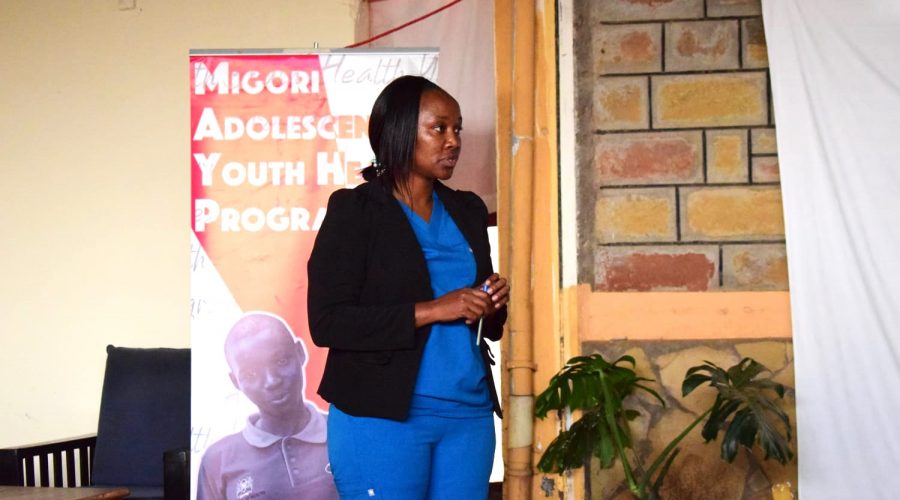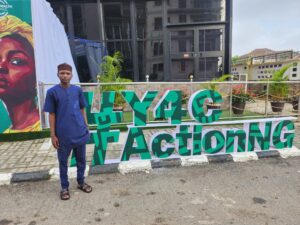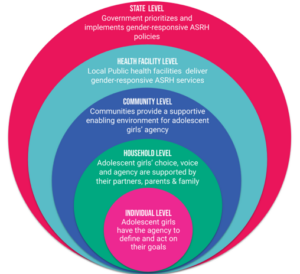I hope that 20 years from now, every adolescent girl will know the value of available reproductive health services for them that are of help as they plan for the lives they want to live. I hope there will be no barrier to access to information, including contraceptives, regardless of where they will be.” Lilian Njoki
By Dionne Warwick Oguna, Senior Associate Communication Manager, A360, PSI
In line with International Women’s Day and in celebration of women forging forward towards girls’ freedoms and equality, A360’s Communications Lead, Dionne Oguna, had a one-on-one with Lilian Njoki, the Coordinator of Child and Adolescent Health in Migori County, Kenya. Lilian is passionate about adolescent and sexual reproductive health rights. She is a mother of three, including two adolescents.
Lilian spoke with Dionne about her experience working with girls in Migori County, what keeps her motivated, and her hopes for every adolescent girl in the county and beyond. Lilian works closely with the Binti Shupavu team, A360’s intervention in Kenya.
Dionne Oguna: What are some of the cultural and societal challenges that continue to impact girls’ access to reproductive health services in Migori County?
Lilian Njoki: Some girls believe that contraceptives can potentially affect their pregnancies and jeopardize their marriages while others believe contraceptives could lead to weight gain and make them less desirable.
The other challenge we have is harmful cultural practices. The Kuria community, for instance, practices female genital mutilation (FGM), which affects girls even as early as nine years. As a cultural practice, FGM prepares girls for early marriages and childbearing. Effectively, it undermines the community’s recognition and appreciation of the importance of contraceptives in reproductive health. Faced with inevitable early pregnancies, the girls drop out of school and give up any dreams for themselves.
The sad bit about all this is that some of these decisions are made by the girls’ parents or guardians, who should be protecting them instead. Sometimes we can rescue these girls and take them back to school but only a few, not all.
Dionne Oguna: Why is it important for you that these girls access contraceptives and how are you helping to revolutionize the future of how adolescents access contraceptives in Migori County?
Lilian Njoki: Every girl has a dream, but most girls may not know that pregnancy can slow them down. I never got pregnant as a teenager, and that is why I have been able to achieve what I have today. All adolescents need to learn about contraception, so they have the information they’ll need to make safe and healthy decisions.
As I said earlier, much misinformation exists regarding sexual reproductive health and contraceptives. Remember, these adolescents have people they listen to; they could be parents, guardians, or even husbands for those who married early. As a response in Migori County, we have involved several stakeholders, including the youth, in the conversation, and our goal is to educate those that influence the access of these services to adolescents. If all the misinformation is addressed, we will be in the right direction toward supporting young girls to achieve their goals.
Besides, our work goes beyond girls who have not given birth and includes teenage mothers. We empower young mothers who cannot go back to school and support them economically so they can fend for themselves. We monitor their contraceptive journey and teach them skills such as soap making. I am impressed that some girls even sell to me.
Dionne Oguna: How are you helping to fill the gaps in the health system so women and girls can access reproductive health services?
Lilian Njoki: I believe in stakeholder engagement and collaboration as an effective response strategy for addressing societal vices. Sometime back, I mapped stakeholders from the education sector to gender, police, youth partners, and religious leaders. Together, we devised a multisectoral way of handling these sexual reproductive health matters for adolescents and youth. We further realized that we needed the young people as part of this team since they know and understand their challenges better. The young people had focus group discussions and identified their priorities, with adolescent pregnancy being one of them.
As a result, we collectively launched an action plan in 2018 that has been guiding us to date. The five-year plan ends this year, and we even had a midterm evaluation. The County Director of Education chairs the multisectoral task force, and Collins Ongola, one of A360’s Youth Innovation Champions, is a member of the task force.
My work is to ensure that everybody plays their role, and we cascade this to the lowest level at the community level, where we have the ward advisory committees. We also go to the villages where we host clinic sessions and bring specific influencers who understand this process and work as one.
We are also keen on meaningful engagement of young people. We can only do a little without them. They will tell you whether they need their services in hospitals, at the chief camps, or even at their teachers’ houses. Young people are unique, and we handle them so.
Dionne Oguna: Briefly, what makes you feel inspired by your work with Binti Shupavu and what motivates you to do what you do?
Lilian Njoki: Collaboration and approach when working with Binti Shupavu.
I get motivated when I see improvement in adolescent pregnancies, HIV, AIDS, and sexual gender-based violence. Collaboration is imperative; ASRH is not a one-person/department show and needs each sector’s effort, including the parents and guardians and the community at large. I am motivated when I see this coming together to improve the health and well-being of these young people. I also have excellent and supportive leadership.
Dionne Oguna: 20 years from now, what do you hope all girls know about the value of contraceptives in helping girls to plan for the lives they want to live?
Lilian Njoki: I hope that 20 years from now, every adolescent girl will know the value of available reproductive health services for them that are of help as they plan for the lives they want to live. I hope there will be no barrier to access to information, including contraceptives, regardless of where they will be.
To achieve this, we must develop policies and frameworks supporting everything I have mentioned above.




